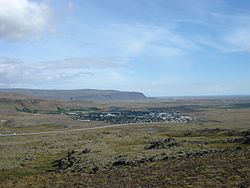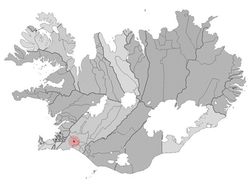Type a search term to find related articles by LIMS subject matter experts gathered from the most trusted and dynamic collaboration tools in the laboratory informatics industry.
Hveragerðisbær | |
|---|---|
 View from Hellisheiði down over Hveragerði | |
 Location of Hveragerðisbær | |
| Coordinates: 63°59′57″N 21°12′24″W / 63.9992211°N 21.2065315°W | |
| Country | Iceland |
| Region | Southern Region |
| Constituency | South Constituency |
| Government | |
| • Manager | Geir Sveinsson |
| Area | |
• Total | 9 km2 (3 sq mi) |
| Population | |
• Total | 2,657 |
| • Density | 295.22/km2 (764.6/sq mi) |
| Postal code(s) | 810 |
| Municipal number | 8716 |
| Website | hveragerdi.is |



Hveragerði (Icelandic pronunciation: [ˈkʰvɛːraˌcɛrðɪ, ˈxʷɛː-] , "hot-spring yard") is a town and municipality in the south of Iceland, 45 km east of Reykjavík on Iceland's main ringroad, Route 1. The river Varmá runs through the town. Hveragerði is the third smallest municipality in Iceland by size.
The surrounding area is part of the Hengill central volcano, and is geothermally active and experiences very frequent (usually minor) earthquakes. The town is known for its greenhouses, which are heated by hot water from volcanic hot springs. The first greenhouse was built in 1923.[1] These springs are the site of occurrence of certain extremophile micro-organisms, that are capable of surviving in extremely hot environments. Close to the church is a hot spring called Sandhólshver ([ˈsantˌhoulsˌkʰvɛːr̥, -xʷɛːr̥], "sand hill hot-spring"), formed during the violent South Iceland earthquake of 1896. A fenced-off geothermal area in the town has numerous hot springs and fumaroles.
Hveragerði contains a number of greenhouses and is a hotbed for Icelandic horticulture.
To the south of Hveragerði, there is the small port of Þorlákshöfn, winter point of departure for the ferry to the Westman Islands.
Water from hot springs has been used for heating in this area since 1929.[2] Hveragerði had 121 inhabitants in 1940 and 399 in 1946.[3] Hveragerði was awarded municipal status (kaupstaðuréttindi) on 1 July 1987.[4] In 1989 the town had 1.593 inhabitants.[5] On 29 May 2008 people were injured and many buildings in Hveragerði and its surroundings were damaged by a Mw6.3 earthquake.
Hveragerðiskirkja, a modern Protestant church, was built 1967–72.[6] Listasafn Árnesinga is a museum of arts founded in 1963 where about 500 pieces of art are exhibited.[7] The exhibition Skjálftinn 2008 in Sunnumörk shopping centre refers to the earthquake of 2008.[8] There is also a swimming pool there called Laugasgarður which is the largest one in Iceland tied with Laugardalslaug which has two 50 m long swimming pools.
Hveragarðurinn is a park with various hot springs and fumaroles and information boards providing explanations on the occurrence.[9] In Lystigarðurinn Fossflöt, a park which was founded in 1983, a hydroelectric power station can be visited which was built as early as 1902 beside the waterfall Reykjafoss.[10]
The local football club is Hamar, who play in Iceland's fourth tier.
Hveragerði is twinned with:[11]
| Climate data for Reykir í Ölfusi (1981–2000) | |||||||||||||
|---|---|---|---|---|---|---|---|---|---|---|---|---|---|
| Month | Jan | Feb | Mar | Apr | May | Jun | Jul | Aug | Sep | Oct | Nov | Dec | Year |
| Record high °C (°F) | 8.2 (46.8) |
9.0 (48.2) |
8.6 (47.5) |
15.1 (59.2) |
19.2 (66.6) |
24.0 (75.2) |
23.3 (73.9) |
21.0 (69.8) |
18.5 (65.3) |
13.0 (55.4) |
10.9 (51.6) |
10.5 (50.9) |
24.0 (75.2) |
| Mean daily maximum °C (°F) | 2.2 (36.0) |
2.2 (36.0) |
2.2 (36.0) |
5.0 (41.0) |
9.3 (48.7) |
12.2 (54.0) |
14.0 (57.2) |
13.2 (55.8) |
10.3 (50.5) |
6.3 (43.3) |
3.8 (38.8) |
2.4 (36.3) |
6.9 (44.5) |
| Daily mean °C (°F) | −0.2 (31.6) |
−0.1 (31.8) |
-0.0 (32.0) |
2.2 (36.0) |
6.2 (43.2) |
9.0 (48.2) |
10.8 (51.4) |
10.3 (50.5) |
7.6 (45.7) |
4.3 (39.7) |
1.8 (35.2) |
0.1 (32.2) |
4.3 (39.8) |
| Mean daily minimum °C (°F) | −2.7 (27.1) |
−2.6 (27.3) |
−2.6 (27.3) |
−0.1 (31.8) |
3.8 (38.8) |
6.7 (44.1) |
8.6 (47.5) |
8.3 (46.9) |
5.4 (41.7) |
2.1 (35.8) |
−0.3 (31.5) |
−2.1 (28.2) |
2.0 (35.7) |
| Record low °C (°F) | −14.4 (6.1) |
−12.7 (9.1) |
−14.9 (5.2) |
−10.1 (13.8) |
−7.3 (18.9) |
−1.3 (29.7) |
2.1 (35.8) |
0.9 (33.6) |
−3.1 (26.4) |
−7.1 (19.2) |
−11.2 (11.8) |
−13.7 (7.3) |
−14.9 (5.2) |
| Average precipitation mm (inches) | 138.5 (5.45) |
139.6 (5.50) |
145.6 (5.73) |
110.0 (4.33) |
127.0 (5.00) |
112.7 (4.44) |
141.5 (5.57) |
159.1 (6.26) |
137.8 (5.43) |
149.3 (5.88) |
133.1 (5.24) |
146.2 (5.76) |
1,640.4 (64.59) |
| Mean monthly sunshine hours | 18.2 | 46.4 | 100.8 | 147.5 | 159.0 | 150.8 | 142.3 | 125.2 | 112.2 | 81.3 | 40.3 | 14.1 | 1,138.1 |
| Source: Icelandic Met Office[12] | |||||||||||||